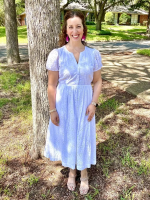In 'Witchcraft for Wayward Girls', Grady Hendrix promises us a totally bewitching time. Fern, not her real name, is 15 years old when she finds herself in trouble...so they say. She moves in to the Wellwood home for Wayward Girls, where she joins Miss Well Woods' garden. Other young unwed mothers to be like Rose, Jasmine, Zinnia and Holly, whose job it is to have their babies in secret, place them for adoption and return to a normal life.
Forgetting this time ever happened. These are girls who lack any agency over their lives. Being told when and what to eat, when and where to sleep, and how they should feel about their situations. But Fern is more than just wayward. She's curious. So when that inquisitive nature leads her and some other girls to discover a book about witchcraft at the home's library, they jump at the chance to take back a little control over their lives.
The spells and the spooky resident librarian in charge of the books, seem like they're not too serious. But when they start to work, Fern and her friends realize that they may be dabbling in magic more powerful than they are prepared for and all choices come with a cost. The best thing about this book is the large and diverse cast of characters, and the dialog between the girls often gives insight into feelings that were supposed to be repressed at that time.
There are statements here about the shaming of women, being dismissive and unfeeling towards suffering in front of you, hypocrisy under the guise of moral or religious upstanding, and the systemic failure of what Fern calls "a machine that took in wayward girls and put out adoptable babies". There are also obvious triggers of the grisly descriptions of labor and delivery and forced closed adoptions, so those with ties to those experiences should read with caution.
The author admits in his note at the end that his role as a childless white man made him leery of taking on this topic. But a personal experience with wayward homes made him want to tell the story. His writing of Fern's protective nature and bold power will stay with you long after the spells are broken. Witchy woman indeed.



